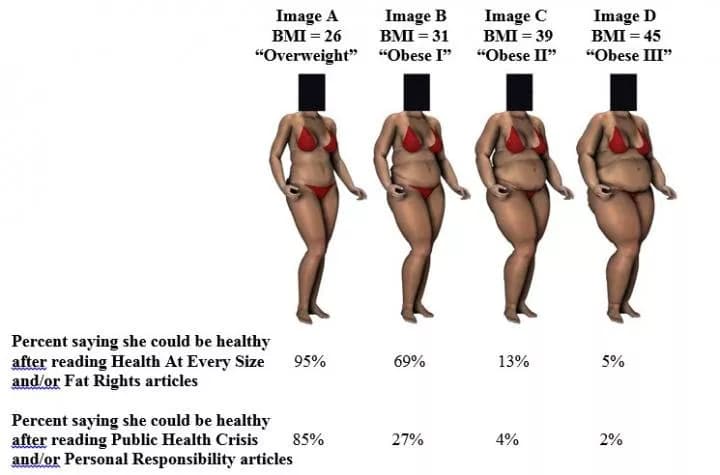Researchers at Chapman University, UCLA, and Stanford have just published work on how news media coverage shapes perceptions of obesity. They examined how perspectives on obesity portrayed in news articles affect people's support for different obesity-related public policies and their prejudice towards fat men and women.
"Our finding that news reporting on obesity as a public health crisis brought on by bad personal choices can worsen anti-fat prejudice and increase people's willingness to charge obese men and women more for insurance" said David Frederick, Ph.D., assistant professor of psychology at Chapman University and lead author on the study. "This is worrisome because there is extensive evidence that weight-based stigma negatively affects health, equal access to employment, earnings, education, and medical care."
The team conducted three experiments where participants read real news articles that framed obesity in different ways to see if they could move the needle in people's attitudes. The frames were drawn from research conducted by Dr. Abigail Saguy for her book "What's Wrong with Fat." The news articles differed in whether they used one of the following:
- "Fat Rights" frame, which emphasizes the idea that obesity is a positive form of body size diversity and that discrimination and prejudice is unacceptable.
- "Health at Every Size" frame, which emphasizes the fact that body fat level is only weakly associated with health once a person's exercise and dietary choices are taken into account (i.e., a person can be both "fit and fat"). This viewpoint encourages people to focus less on what the scale says and more on exercising and eating healthy.
- "Public Health Crisis" frame, which presents obesity as a public health crisis warranting government intervention.
- "Personal Responsibility" frame, which suggests bad food and exercise choices -- as opposed to genetics or social factors -- make people fat.
In the experiments, subjects were given real news articles that represented each frame. Computer generated images of women varying in body size were then presented and the participants were asked if a woman could be healthy at each of the weights. The researchers found that it was possible to shift people's attitudes towards "overweight" women. People who read the "health at every size" or "fat rights" articles were substantially more likely to say that overweight women could be healthy at their weight (65 percent to 71 percent across the three experiments) than participants who read "public health crisis" or "personal responsibility articles" (25 percent to 27 percent across the three experiments). People were somewhat more willing to say that an obese woman could be healthy at her weight, but the results were not consistently statistically significant across the studies. Participants also completed measures of anti-fat prejudice and beliefs that obesity is dangerous.
"Our findings suggest that simply covering research showing that people can be both fat and healthy will not suffice to reduce prejudice," said Dr. Frederick. He added that, "the takeaway message from these experiments is that news coverage of medical studies influence people's attitudes toward obesity. Only the fat rights frame, however, reduced prejudice in their responses."
The ultimate conclusion of the study demonstrated that in the contemporary U.S., a visceral dislike of fatness makes anti-fat attitudes persist even after people are exposed to research showing that a person can be fat and healthy.
"Given that anti-fat stigma is a health risk and a barrier to collective solidarity, fat rights viewpoints can buffer against the negative consequences of anti-fat stigma and promote a culture of health by fostering empathy and social justice," said Dr. Abigail Saguy. "Only a more radical fat rights approach was able to mitigate anti-fat prejudice. Therefore, disseminating health information will not be sufficient to promote a culture of health."
All of the participants in this study were Southern California university students, indicating that they grew up in a time in which the public health crisis frame was dominant and were residing in a region where pressures to be thin are especially intense.
The above post is reprinted from materials provided by Chapman University. Note: Materials may be edited for content and length.
Disclaimer: DoveMed is not responsible for the adapted accuracy of news releases posted to DoveMed by contributing universities and institutions.
Primary Resource:
Frederick, D. A., Saguy, A. C., & Gruys, K. (2015). Culture, Health, and Bigotry: How Exposure to Cultural Accounts of Fatness Shape Attitudes about Health Risk, Health Policies, and Weight-Based Prejudice. Social Science & Medicine.
Related Articles
Test Your Knowledge
Asked by users
Related Centers
Related Specialties
Related Physicians
Related Procedures
Related Resources
Join DoveHubs
and connect with fellow professionals


0 Comments
Please log in to post a comment.